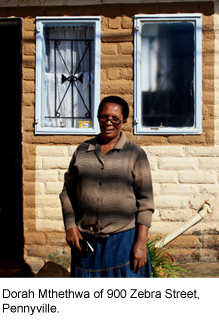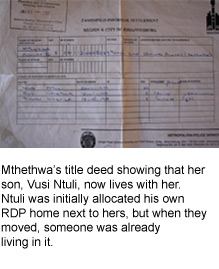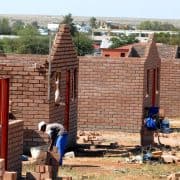|
Getting your Trinity Audio player ready...
|
 16 April 2012 – Corruption Watch has spent two weeks gathering damning RDP housing-corruption evidence from the field and putting pressure on the authorities to respond – this is what we’ve uncovered …
16 April 2012 – Corruption Watch has spent two weeks gathering damning RDP housing-corruption evidence from the field and putting pressure on the authorities to respond – this is what we’ve uncovered …
Residents of Pennyville, a mixed housing development near Soweto, were the first to open up.
The community of about 10 000 residents live in government-provided housing, which includes free RDP homes and rental flats.
Built in four phases, Pennyville offers different housing options for beneficiaries: 1 600 RDP houses provided for free by government; 200 Johannesburg Social Housing Company (Joshco) affordable-rental units for R2 200 rental a month; 600 Joshco communal units where one can rent a room in a flat for R225 or the entire flat for R800 a month; and 800 middle and high-income rental units offered by investors and banks at rates of between R4 800 to R6 000 a month.
Most residents are former inhabitants of Zamimpilo informal settlement in Riverlea, about 15 minutes from Pennyville.
More than 1 600 families were moved from Zamimpilo to Pennyville in 2008.
Xolile Sigenu, chairperson of the Pennyville Community Forum said: “We are investigating which people are selling off RDP houses [illegally] and which people never lived at the squatter camp, but were allocated houses.”
Sigenu initially revealed the story of the Raolale family to Afrikaans newspaper Beeld, following a tip-off from Corruption Watch.
He also said there could be a link between the previous committee forum and corrupt dealings with RDP housing.
“We had a community forum which was disbanded when the new councillor, who is from the Democratic Alliance, was elected. I’m one of the newly elected members of this community forum,” Sigenu said, adding that “the old forum is giving the new one problems – it wants to rule by force so that their scandals are not revealed”.
Sigenu also gave Corruption Watch the name of an official at the City of Joburg municipality, who he believes is involved with housing irregularities in Pennyville.
“[This person] appoints the people who come and do investigations and they always come back saying there is nothing wrong here,” he told Corruption Watch.
Asked if the municipality engages with residents on such issues, City of Joburg communications representative Bubu Xuba told Corruption Watch: “There are regular community meetings held by ward councillors and in those meetings, issues of housing developments are also discussed.”
RDP housing allocation explained
“Before a beneficiary can be allocated an RDP house, they first have to apply for a housing subsidy at the offices of the Gauteng Department of Housing. After approval, the applicant is linked to a specific housing project,” Xuba said.
“On completion of that project, a list of approved beneficiaries is sent to the City of Joburg Housing Department for allocation.”
When allocating houses, the City prioritises people who are on the 1996/7 waiting list, child-headed households, people with disabilities, the aged and liberation movement veterans, according to Xuba.
 Dorah Mthethwa, of 900 Zebra Street, believes her son was “conned” out of the home he was allocated.
Dorah Mthethwa, of 900 Zebra Street, believes her son was “conned” out of the home he was allocated.
Mthethwa told Corruption Watch: “I applied with my son, Vusi Ntuli, at the same time for an RDP house. We lived in shacks next to each other at Zamimpilo; mine was 304b and his was 305b.”
When the mother and son went to check up on the allocation at the Gauteng Department of Housing in 2006, it reflected that they were both going to be placed at Pennyville and their homes would be next to each other.
“Firstly there’s no policy that stipulates that people should be allocated housing next to each other regardless of their relationship. We, however, try our best to accommodate such requests where possible – but this does not mean we are any obligation to do so,” said Xuba.
But when the two actually moved, they found that Ntuli’s house was already occupied.
Mthethwa said: “The Pennyville project was not yet finished when we were placed in our homes, but some people who had occupied the homes were not on the list of those granted houses.”
Xuba told Corruption Watch: “As for her son not being allocated a house, in the short time given to us to respond, we have no access to the actual records at hand. Broadly speaking, we believe there may have been certain underlying factors that contributed or led to him not being allocated a house.”
These “underlying factors” could be that the applicant may already be a registered house-owner elsewhere, or that he became employed and his income bracket changed – therefore disqualifying him for the house he applied for, said Xuba.
Asked if she took the matter up with the relevant authorities, Mthethwa said: “We went to check if there was something wrong with the house allocation back in 2007 because on the first list in 2006 his name appeared, but on the 2007 one it no longer did, and we didn’t get an answer.
“It’s sad when you see a person you never knew from the squatter camp living next to you, when you know very well the house was supposed to be your son’s.”
Xuba said of Mthethwa’s situation: “She should contact the Gauteng Department of Housing in their capacity as administrators of the housing subsidy. They will be in a position to inform her why her son is off the list.”
Another member of the Pennyville community forum, who spoke on condition of anonymity for fear of further victimisation, said there are a number of people from Zamimpilo who have sold their RDP allocated houses.
He told Corruption Watch: “I was once victimised for blowing the whistle to auditors about houses that have been sold – that’s why now I just mind my own business except for complaints by community members about another person making their lives here miserable.”
According to the source, there are Pennyville RDP housing beneficiaries who have sold their properties for sums ranging from R90 000 to R50 000.
He said all these people relocated back to their original homes, mostly in rural Eastern Cape and KwaZulu-Natal.
City of Joburg’s Xuba told Corruption Watch: “By law, a beneficiary is expected to live or stay in the allocated house for at least eight years before deciding to sell the house. When such decision is made, first preference should be given to the City or government to buy the house.
“Failure to do so can be regarded as fraud and the beneficiary can be charged with committing a criminal act.”
Another resident of Pennyville, who lives in the rental flats, John Maluleke, told Corruption Watch how easy it is to purchase an RDP house from the original owner.
“At all these places where RDP homes are allocated, the people who sell the houses use the same method.”
According to Maluleke, the owner of the RDP house goes with the prospective “buyer” to a police station where they write out an affidavit.
This document will state that the “buyer” has been helping the original owner financially and, for this reason, the original owner would like to leave the home to this person as the owner is relocating back to his or her rural home town.
The affidavit states the worth of the “financial help” and is signed by both parties.
“When the auditors come through to check the title deeds, the new owner shows them the affidavit. The new owner will then be asked to contact the original owner of the house so auditors can verify the claims, but this will take years as the new owners do not have the right addresses or contact details of the original owner,” said Maluleke.
The new occupant will continue to live there until, perhaps, a member of the original owner’s family decides to contest the affidavit.
“The City is pursuing a legal route on how to deal with people selling RDP houses illegally. Investigations are under way to plug the number of reported fraudulent sales of RDPs. We will also be embarking on educational campaigns around this issue,” Xuba told Corruption Watch.
Gauteng housing department owns up
The Gauteng housing department says it is aware of widespread corruption with regard to RDP housing, but that people are reluctant to report cases for fear of victimisation, making prosecution difficult.
The department’s Motsamai Motlhaolwa confirmed this with Corruption Watch on 10 April.
Mogale City on the west rand is reportedly a hot spot, but the issue of bringing those responsible to book is proving to be a hindrance.
The DA’s Johannesburg spokesperson for housing, Tsepo Mhlongo, said they had similar problems when they wanted to lodge cases with the police.
“People will report cases to us, but when it comes to laying a charge with the police, or even giving us identity numbers or phone numbers they are reluctant to go on record,” said Mhlongo.
“This leaves us with anecdotal information which is hard to take to the police to investigate.”
Mhlongo confirmed the names of officials implicated in cases in Pennyville. These individuals’ names are known to Corruption Watch.
There is also evidence that houses are being sold for up to R45 000 to families in the Chief Mogale housing project in Kagiso, also on the west rand. In some cases, the houses are rented out – similar to the Pennyville situation.
The provincial department is now battling to evict residents who have bought into the project illegally, bypassing those on the list, and could be facing a lengthy court battle.
“We have a fraud and anti-corruption unit that investigates reports on corruption relating to RDP houses and there have been a number of prosecutions,” Motlhaolwa said.
“A month and a half ago an official was sentenced for selling houses in Mogale City.”
Motlhaolwa added that officials have also been suspended and dismissed for involvement in housing corruption.
“However, there is reluctance on the part of people who have been asked for bribes, or who know of officials asking for bribes to come to authorities”
“Give us the evidence and we will follow it up, “he said.
The DA’s Mhlongo believes the present system, which makes it difficult for people to see where they are on the housing list, is contributing to the problem.
“It’s the old problem highlighted continuously by the DA. If people cannot see where they are supposed to be on the list, then it’s hard for them to prove that they have been bypassed.
“The allocation is not transparent, so we still have people who have been on the list since 1996.”
He said this contributes to the corruption as people begin to believe that they will never receive a house unless they pay an official.
Corruption Watch has also received complaints relating to RDP housing corruption in Ermelo and Khayelitsha.
Related articles:







